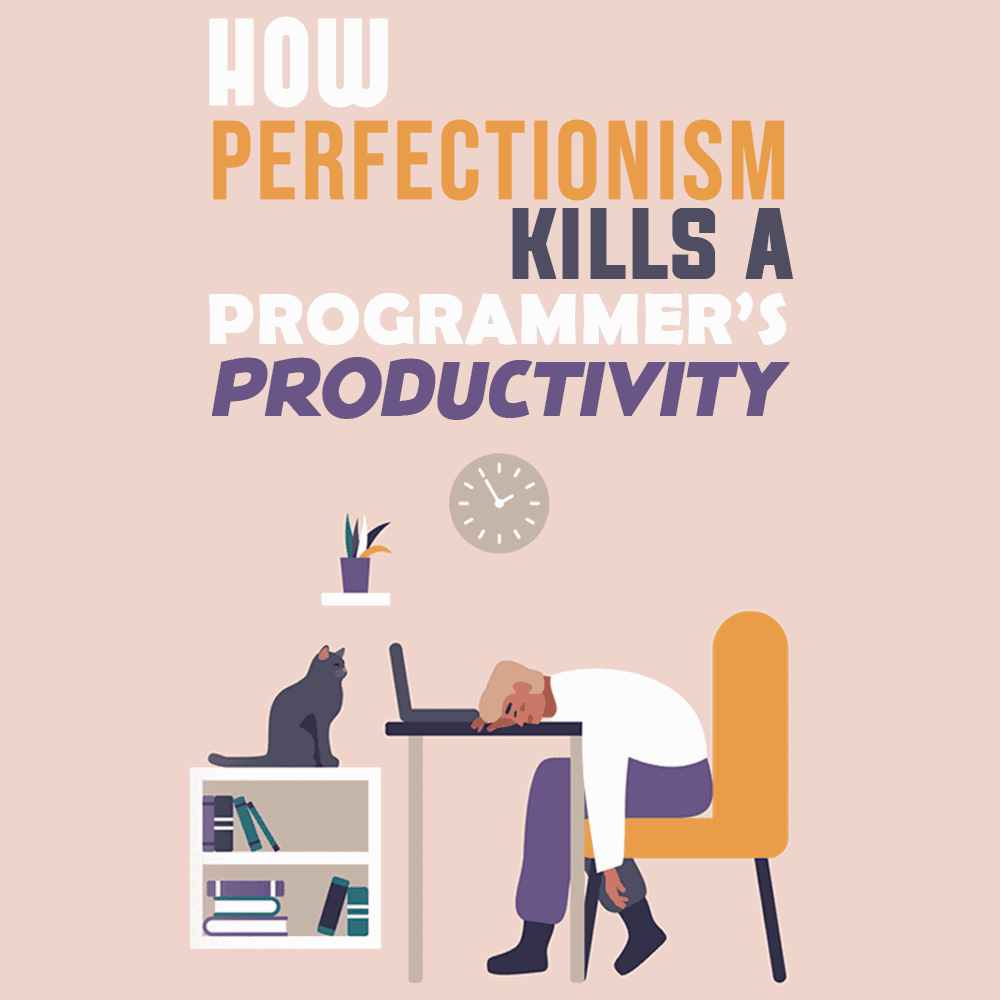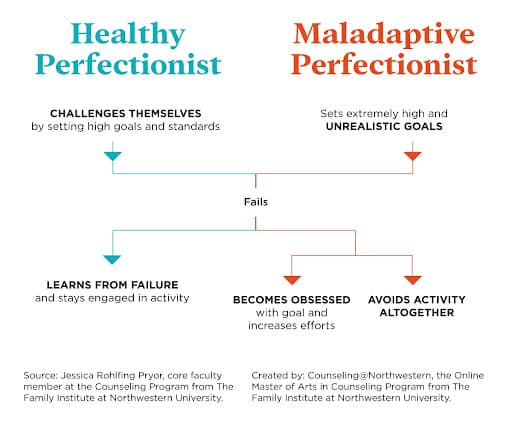 You can often hear someone proudly say, “I am a perfectionist,” then adding, “Look, I am doing everything perfectly.” In fact, there is nothing to be proud of.
You can often hear someone proudly say, “I am a perfectionist,” then adding, “Look, I am doing everything perfectly.” In fact, there is nothing to be proud of.
Unless we are talking about light perfectionism—such as being pleased with perfectly laid out napkins on the table—the painful desire to achieve perfection in any business is a sure way to reduce productivity.
It would seem that people who strive to do everything perfectly should be more successful in work and life. But in practice, it is perfectionists who are the most inveterate procrastinators and lazy people. Why is this happening? Let’s find out.
In this post I will show you why being a perfectionist harms a programmer’s productivity. I will also share with you tips on recognizing perfectionism in your own behavior as well as tips to get rid of it. This will help you become more productive, at the same time reducing stress.
Why Perfectionism Harms Productivity
Perfectionists waste a lot of time perfecting the little things. They can’t ignore insignificant details and as a result devote the same amount of time and attention to everything they do in a vain attempt to bring every little thing to perfect execution.
At the same time, perfectionism can lead to procrastination. Since a perfectionist wants to do everything perfectly, it is much harder to tackle any issue. The burden of responsibility for the quality of implementation is so pressing that it is easier to postpone the performance altogether.
Despite what one may think, it is the perfectionists who push things back because “the mood is not right” or “I’m tired” or “it won’t work out as perfectly now as when I feel well.”
Paradoxical as it may sound, perfectionists are the people who have the biggest mess at home because it takes 10 times longer to get perfect cleanliness than a simple order. Knowing how hard it is to do such cleaning, people prone to perfectionism prefer not to take it up at all.
Moreover, the world dictates its own rules that run counter to the desire to do everything perfectly. Less-than-perfect products and projects are launched on the market and are then polished with the help of feedback. Perfectionists can’t do that and end up missing chances. While they are trying to create the perfect product, other people make fortunes with raw but relevant ideas.
The truth is, learning by doing is an effective way to develop today. Sadly for perfectionists, it is precisely this that is not available to them. They prefer not to try what they do not know how to do or prefer to drop out of training after the first attempts, experiencing acute dissatisfaction with the results of their experiments.
Indeed, an approach like “I can’t do it unless I do it perfectly” has ruined a lot of ideas and projects. An average programmer with a revolutionary idea but without the skills to implement it is rarely stopped; they just learn what they need and proceed. Conversely, the perfectionist most likely won’t do it at all out of fear that it will not work out perfectly.
In the end, perfectionists spend too much energy on guilt. But mental well-being is as much an exhaustible resource as time or money. You can spend it on a fuse of inspiration and do something cool, or you can use it to indulge in self-flagellation and feel guilty for not performing your duties perfectly.
With this in mind, let’s take a look at the insidious signs that reveal how perfectionism might be affecting both your programming career and your life in general.
Signs That Perfectionism Is Ruining Your Life

Problematically, however, it’s almost impossible to determine the degree of your perfectionism independently. Still, let’s take a look at some warning signs that might indicate perfectionism interferes with your productivity. If you recognize yourself in the list below, it might be time to start fighting perfectionism.
You Constantly Think That You Did Not Do Things Well Enough
The biggest problem with hard-core perfectionists is the painful pursuit of excellence. And perfection, as we know, does not exist.
Yes, you can perfectly make your bed, without a single fold, lay out the pillows on the ruler, and be satisfied, but it is impossible to paint the perfect picture. And the frustration with the chasm that lies between your work and how you imagine the ideal can be so big that you will give up altogether.
You Have Self-Esteem Problems
Constant dissatisfaction with the results of your work makes you dwell on failures and lowers your self-esteem. You end up feeling guilty even about tiny things, and you are very sensitive to criticism.
Normally, people do not pay attention to minor flaws in their work, but perfectionists are tormented by pangs of conscience even for little flaws. However, feeling guilty is extremely destructive—what kind of harmony and self-development can we talk about if you are haunted by the feeling that you are constantly making mistakes and doing everything very poorly?
You Can’t Make Drafts and You Progress Slowly
The perfectionist tries to do everything perfectly, which excludes the possibility of rough work—a necessary element in many areas.
If you are thinking of writing a program, but you cannot go beyond the first few lines of code because you are constantly rewriting it in an attempt to achieve the ideal, then this point describes you.
Imperfections Drive You Crazy
Have you seen these “perfectionist nightmare” compilations on sites? They are funny for some, but for people with moderate or severe perfectionism, they can cause real discomfort.
Or, another example: Have you ever met a person who begins to place cans on the shelves in a store and then turn all labels straight ahead or a person who hangs clothes according to colors and sizes? Some people really cannot ignore such things. If you recognize yourself in the above, it’s definitely a warning sign.
But there’s no need to despair. There is a way to combat perfectionism. Let’s see how.
How To Get Rid of Perfectionism: Managing Time
Many people who are suffering from perfectionism have wondered how to get rid of it. Unfortunately for them, there is no easy way out of this troublesome habit. However, there are ways in which you can overcome it and improve your lifestyle significantly.
In this section, I will share with you some tips to help you better manage your time and so remove the factors that can cause perfectionist behavior. I will also share the time management method I use on a daily basis in order to successfully improve my lifestyle: the Pomodoro Technique.
The Pomodoro Technique is simple and powerful and has the potential to completely change your view of time management. In essence, the Pomodoro Technique asks you to focus on one task for an extended period of time, even though it is something minor.
As you do so, you cannot help but think about how great that task would turn out to be in its finished form. As you continue to focus on the task, you gradually decrease its duration. You will reach a point where you barely even notice its presence. The Pomodoro Technique aims to force you to look at the big picture, which is what you should do instead of dwelling on little details.
The Pomodoro Technique is very useful in situations when you feel that your imperfections are interfering with your progress.
For example, if you feel that you are spending too much time planning your tasks, you can spend an hour planning one task and do nothing else for a half-hour. You can then measure how successful you have been at planning and completing small tasks by gauging how long and how much work you have done.
In this way, you will see for yourself how to get rid of perfectionism by reducing the number of tasks you perform on a daily basis. Of course, it will be impossible for you to reduce all your tasks to zero. However, you should aim at reducing the imperfections in each task.
One way to reduce the number of tasks you perform is to focus on completing a task without too much attention to detail.
For instance, if you are planning to paint the walls of your house, you will not be perfect at painting the walls. If you are not that good with colors, you may still want to paint the walls. However, the task should be completed without too much thought given to achieving perfection. Perfectionists love working on detailed projects, but when they begin to see the end result, they immediately start to hate the task and want to give up.
Combat Perfectionism and Become More Productive
Perfectionism can lead to stress, frustration, and even burnout. Instead, you should strive to be satisfied with yourself. Once you do that, being able to accept yourself for who you are, you will not need to define yourself by your perfect behavior.
Despite what people might think, perfectionists are not productive. Instead, they have trouble finishing tasks and end up missing opportunities. As we saw in this post, perfectionists can’t easily cope with many of the modern-day realities of the workplace and the world in general.
Perfectionism can cause many problems in your life, but by accepting yourself for who you are, you can increase your productivity while being content and stress-free.

